[Form2]Study_Plan
澳洲签证商科study plan范文英文
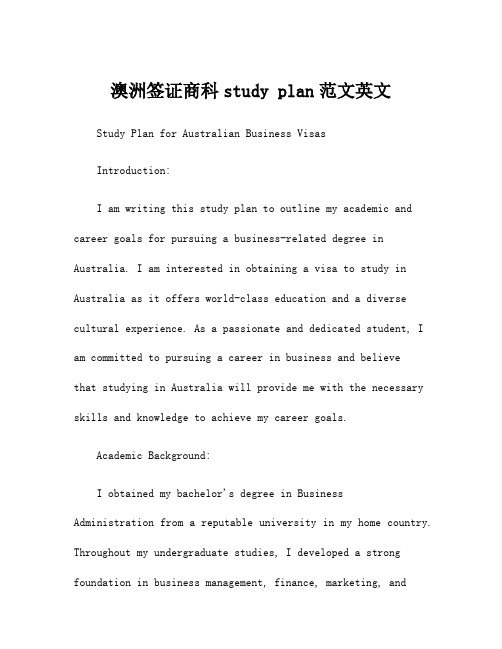
澳洲签证商科study plan范文英文Study Plan for Australian Business VisasIntroduction:I am writing this study plan to outline my academic and career goals for pursuing a business-related degree in Australia. I am interested in obtaining a visa to study in Australia as it offers world-class education and a diverse cultural experience. As a passionate and dedicated student, I am committed to pursuing a career in business and believethat studying in Australia will provide me with the necessary skills and knowledge to achieve my career goals.Academic Background:I obtained my bachelor's degree in BusinessAdministration from a reputable university in my home country. Throughout my undergraduate studies, I developed a strong foundation in business management, finance, marketing, andeconomics. I also participated in various internships and extracurricular activities to gain practical experience and enhance my professional skills.Career Goals:After completing my studies in Australia, I aim to pursue a career in international business or marketing. I am particularly interested in working for multinational corporations or global organizations to gain exposure to diverse markets and expand my professional network. I aspire to become a successful entrepreneur and start my own business in the future. I believe that studying in Australia will provide me with the necessary knowledge and skills to achieve my career goals.Reasons for Choosing Australia:Australia is renowned for its high-quality education system and vibrant multicultural society. As an international student, I am attracted to the opportunity to study in acountry that values diversity and offers a supportive environment for students from around the world. Australia's business schools are known for their excellence in providing practical and industry-relevant education, which aligns with my career aspirations.Study Plan:I have carefully researched and chosen a Master's program in Business Administration at a prestigious university in Australia. This program will equip me with a deeper understanding of global business practices, strategic management, and leadership skills. Furthermore, theuniversity's strong industry connections and emphasis on experiential learning will provide me with valuable insights and opportunities to engage with professionals in the business field.Upon completion of my degree, I plan to participate in internships or work placements to gain hands-on experienceand apply the theoretical knowledge acquired during my studies. I am also eager to engage in networking events and workshops to build connections with industry professionals and expand my career opportunities.I am committed to actively participating in extracurricular activities and student organizations to enhance my leadership and teamwork abilities. I am keen on exploring research opportunities and collaborating with faculty members on business-related projects to further develop my analytical and problem-solving skills.Benefits to My Home Country:Studying in Australia will not only benefit my personal and professional development but also contribute to the growth of my home country's economy. Upon returning to my home country, I aim to apply the knowledge and skills acquired during my studies to make a positive impact on local businesses and contribute to the development of the businesssector. Furthermore, I hope to share my experiences and insights with aspiring entrepreneurs and students to inspire and mentor the next generation of business leaders.Conclusion:In conclusion, I am eager to pursue a business-related degree in Australia to achieve my academic and career goals. Through this study plan, I have outlined my academic background, career aspirations, and reasons for choosing Australia as my study destination. I am confident that my dedication, enthusiasm, and commitment to personal and professional growth will make me a valuable addition to the Australian education system and the global business community.I look forward to the opportunity to study in Australia and contribute to the country's vibrant academic and business environment.。
my unimelb study plan

my unimelb study plan"my unimelb study plan"My study plan as a student at the University of Melbourne (Unimelb) revolves around achieving success academically while also ensuring personal growth and development. In this article, I will outline my step-by-step approach to navigating the challenges and maximizing the opportunities available at Unimelb.Step 1: Setting clear goalsThe first step in creating a study plan is to define my academic, personal, and professional goals. These goals act as a compass, guiding me towards the path I want to follow during my time at Unimelb. Whether it is aiming for a high GPA, securing internships or research opportunities, or developing transferable skills, having clearly defined goals will keep me motivated and focused.Step 2: Researching course requirementsWith my goals in mind, the next step is to thoroughly research the course requirements and structure. By doing so, I can get a better understanding of how to effectively plan my subjects and spread my workload across semesters. This research also allows me toexplore elective options that align with my interests and complement my major, offering a more holistic educational experience.Step 3: Prioritizing time managementTime management is crucial in balancing academic commitments, extracurricular activities, part-time jobs, and personal life. I believe in adopting a proactive approach by creating a detailed schedule that includes study hours, assignment deadlines, and review periods. This way, I can allocate sufficient time for each task and avoid last-minute rushes, ensuring a smoother and more efficient study experience.Step 4: Utilizing university resourcesUnimelb provides a plethora of resources to support students academically and personally. The fourth step in my study plan involves fully utilizing these resources. This includes attending lectures, tutorials, and workshops, visiting the library for research, accessing online databases, and seeking guidance from academic advisors and career counselors. Taking advantage of these resources will enhance my learning experience and facilitate my personal growth.Step 5: Active engagement in classActive engagement in class is integral to optimizing learning outcomes. To achieve this, I plan on participating actively in discussions, asking clarifying questions, and taking comprehensive notes. Additionally, I aim to form study groups with like-minded peers, fostering a collaborative learning environment that benefits all parties involved. Active engagement helps consolidate knowledge, improves critical thinking skills, and boosts overall academic performance.Step 6: Efficient study techniquesUtilizing effective study techniques is vital in ensuring deep understanding and retention of course material. My study plan emphasizes techniques such as spaced repetition, visual aids, summarizing key concepts, and practicing past exam papers. By adopting a variety of study strategies tailored to individual subjects, I can optimize my learning potential and perform well in assessments.Step 7: Seeking feedback and self-reflectionRegularly seeking feedback from professors and peers allows me toidentify areas for improvement and refine my study plan accordingly. Additionally, engaging in self-reflection helps me assess my progress, strengths, and weaknesses, enabling targeted efforts towards personal and academic growth. I plan on setting aside time each week for reflection and incorporating feedback into my study routine.Step 8: Balancing work and restLastly, my study plan acknowledges the importance of maintaining a healthy work-life balance. It is crucial to allocate time for relaxation, exercise, hobbies, and spending time with friends and family. Taking breaks and engaging in self-care activities rejuvenates the mind and enhances productivity when returning to study. By striking a balance between work and rest, I can avoid burnout and ensure a sustainable study plan.In conclusion, my study plan at Unimelb incorporates setting clear goals, researching course requirements, prioritizing time management, utilizing university resources, active engagement in class, efficient study techniques, seeking feedback, and maintaining a healthy work-life balance. With this strategicapproach, I am confident in achieving success both academically and personally at the University of Melbourne.。
最新人教版(PEP)小学英语六年级上册复习资料
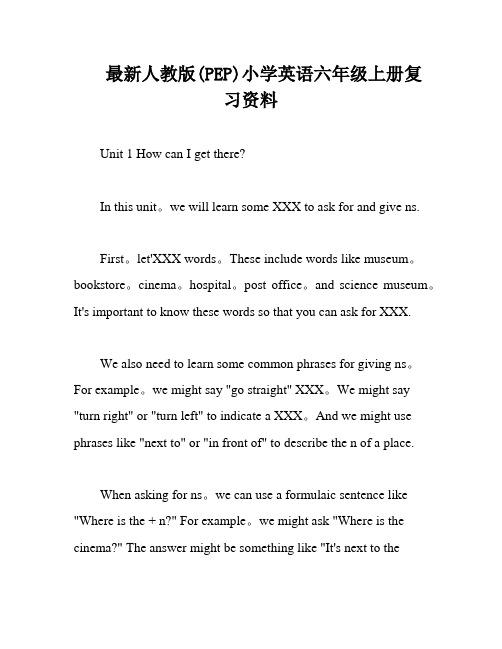
最新人教版(PEP)小学英语六年级上册复习资料Unit 1 How can I get there?In this unit。
we will learn some XXX to ask for and give ns.First。
let'XXX words。
These include words like museum。
bookstore。
cinema。
hospital。
post office。
and science museum。
It's important to know these words so that you can ask for XXX.We also need to learn some common phrases for giving ns。
For example。
we might say "go straight" XXX。
We might say "turn right" or "turn left" to indicate a XXX。
And we might use phrases like "next to" or "in front of" to describe the n of a place.When asking for ns。
we can use a formulaic sentence like "Where is the + n?" For example。
we might ask "Where is the cinema?" The answer might be something like "It's next to thehospital." We can also ask "How can I get to + n?" or "Can you tell me the way to + n?" These are all ways to ask for ns.Finally。
作文范文之studyplan作文
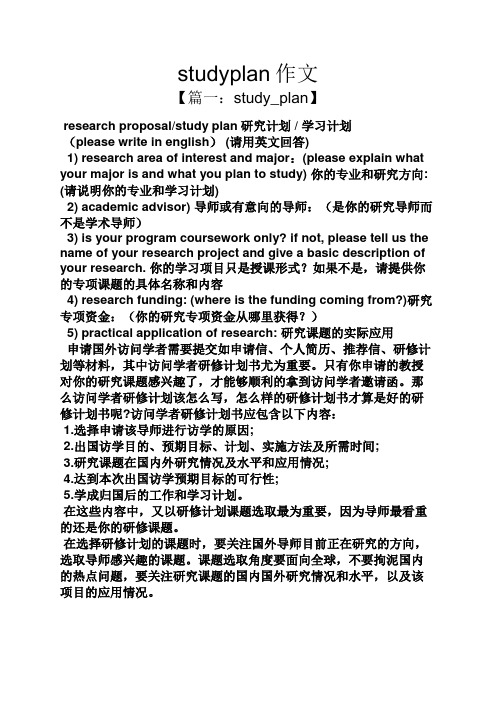
studyplan作文【篇一:study_plan】research proposal/study plan研究计划 / 学习计划(please write in english) (请用英文回答)1) research area of interest and major:(please explain what your major is and what you plan to study) 你的专业和研究方向: (请说明你的专业和学习计划)2) academic advisor) 导师或有意向的导师:(是你的研究导师而不是学术导师)3) is your program coursework only? if not, please tell us the name of your research project and give a basic description of your research. 你的学习项目只是授课形式?如果不是,请提供你的专项课题的具体名称和内容4) research funding: (where is the funding coming from?)研究专项资金:(你的研究专项资金从哪里获得?)5) practical application of research: 研究课题的实际应用申请国外访问学者需要提交如申请信、个人简历、推荐信、研修计划等材料,其中访问学者研修计划书尤为重要。
只有你申请的教授对你的研究课题感兴趣了,才能够顺利的拿到访问学者邀请函。
那么访问学者研修计划该怎么写,怎么样的研修计划书才算是好的研修计划书呢?访问学者研修计划书应包含以下内容:1.选择申请该导师进行访学的原因;2.出国访学目的、预期目标、计划、实施方法及所需时间;3.研究课题在国内外研究情况及水平和应用情况;4.达到本次出国访学预期目标的可行性;5.学成归国后的工作和学习计划。
外研版高中英语选择性必修第2册 Unit 2 Project
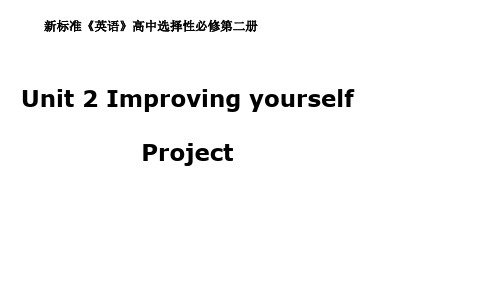
Present
1 After you have completed your 30-day challenge, share your experiences with your group.
2 Present your challenge and the plan to the class. Describe your experience, showing any photos or videos, and explaining what you have learnt and achieved from the process.
Plan
1 Work in groups to focus on an area of self-management.
2. Discuss strategies for improving in this area of self-management and compile a 30-day plan. Consider the following: • What do you want to achieve in 30 days? • When will you start? • How much time do you need each day or week? When is it best for you to carry out the plan? • What activities could help you achieve your goals? What kind of help might you need from the people around you? • Is it best to carry out your plan in pairs or in groups?
读书计画StudyPlan
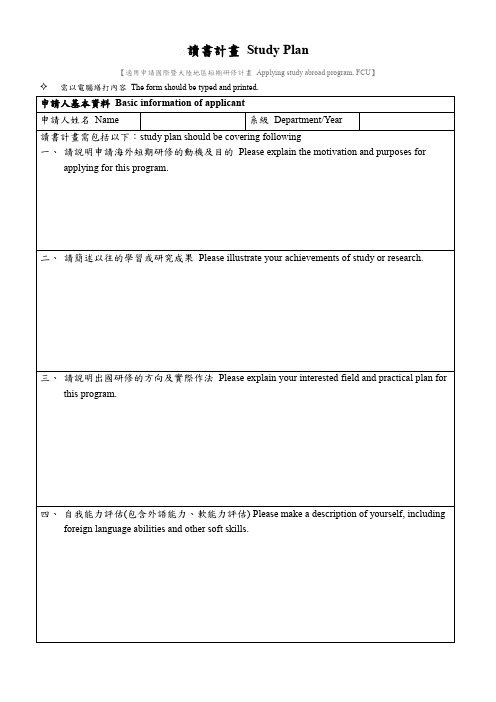
【適用申請國際暨大陸地區短期研修計畫Applying study abroad program, FCU】
需以電腦繕打內容The form should be typed and printed.
申請人基本資料Basic information of applicant
申請人姓名Name
4、自我能力評估(包含外語能力、軟能力評估) Please make a description of yourself, including foreign language abilities and other soft ski
(1)基本資料(who you are in life)
(2)人生態度(what life means to you)
(3)未來期許(what your outlook on the future is)
(4)結論(conclusion)
申請人簽名Signature:
系級Department/Year
讀書計畫需包括以下:study plan should be covering following
1、請說明申請海外短期研修的動機及目的Please explain the motivation and purposes for applying for this program.
2、請簡述以往的學習或研究成果Please illustrate your achievements of study or research.
3、請說明出國研修的方向及實際作法Please explain your interested field and practical plan for this program.
考研英语押题(精华版)1
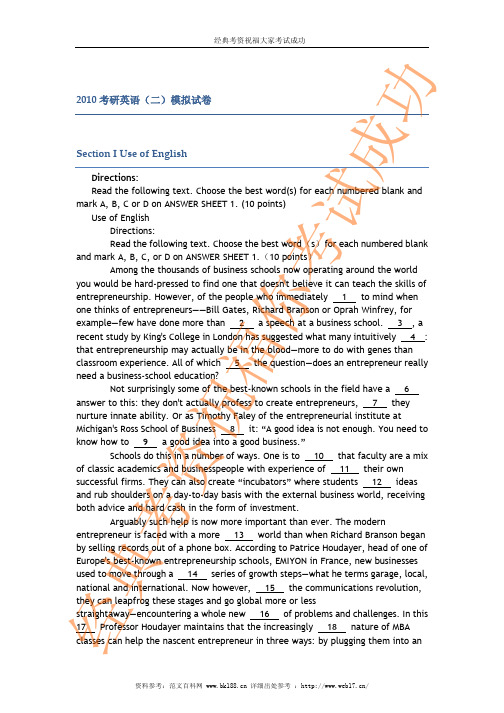
2010考研英语(二)模拟试卷Section I Use of EnglishDirections:Read the following text.Choose the best word(s)for each numbered blank and mark A,B,C or D on ANSWER SHEET 1.(10points)Use of EnglishDirections:Read the following text.Choose the best word (s )for each numbered blank and mark A,B,C,or D on ANSWER SHEET 1.(10points )Among the thousands of business schools now operating around the world you would be hard-pressed to find one that doesn't believe it can teach the skills of entrepreneurship.However,of the people who immediately 1to mind when one thinks of entrepreneurs——Bill Gates,Richard Branson or Oprah Winfrey,for example—few have done more than 2a speech at a business school.3,a recent study by King's College in London has suggested what many intuitively 4:that entrepreneurship may actually be in the blood—more to do with genes than classroom experience.All of which 5the question—does an entrepreneur really need a business-school education?Not surprisingly some of the best-known schools in the field have a 6answer to this:they don't actually profess to create entrepreneurs,7they nurture innate ability.Or as Timothy Faley of the entrepreneurial institute atMichigan's Ross School of Business 8it:“A good idea is not enough.You need to know how to 9a good idea into a good business.”Schools do this in a number of ways.One is to 10that faculty are a mix of classic academics and businesspeople with experience of 11their own successful firms.They can also create “incubators”where students 12ideas and rub shoulders on a day-to-day basis with the external business world,receiving both advice and hard cash in the form of investment.Arguably such help is now more important than ever.The modernentrepreneur is faced with a more 13world than when Richard Branson began by selling records out of a phone box.According to Patrice Houdayer,head of one of Europe's best-known entrepreneurship schools,EMIYON in France,new businesses used to move through a 14series of growth steps—what he terms garage,local,national and international.Now however,15the communications revolution,they can leapfrog these stages and go global more or lessstraightaway—encountering a whole new 16of problems and challenges.In this 17Professor Houdayer maintains that the increasingly 18nature of MBA classes can help the nascent entrepreneur in three ways:by plugging them into an 经典考资祝福你考试成and opportunities 19with dealing across different cultures and by 20them to the different ways that business is conducted around the globe.1.[A ]bring [B ]call [C ]spring [D ]apply 2.[A ]report [B ]deliver [C ]prepare [D ]compose 3.[A ]Indeed [B ]Likewise [C ]Therefore [D ]Furthermore 4.[A ]conclude [B ]assume [C ]neglect [D ]suspect 5.[A ]stirs [B ]arouses [C ]proves [D ]invites 6.[A ]ready [B ]unique [C ]positive [D ]favorable 7.[A ]yet [B ]rather [C ]nor [D ]nevertheless 8.[A ]states [B ]makes [C ]puts [D ]interprets 9.[A ]shift [B ]transfer [C ]modify [D ]transform 10.[A ]ensure [B ]assure [C ]affirm [D ]enlighten 11.[A ]carrying on [B ]setting up [C ]working out [D ]turning around 12.[A ]convey [B ]cherish [C ]nurture [D ]impart 13.[A ]complex [B ]complicated [C ]complementary [D ]fantastic 14.[A ]variable [B ]obvious [C ]imperative [D ]distinct 15.[A ]thanks to [B ]but for [C ]for all [D ]next to 16.[A ]bulk [B ]host [C ]set [D ]magnitude 17.[A ]position [B ]context [C ]perspective [D ]dimension 18.[A ]similar [B ]differential [C ]diverse [D ]versatile 19.[A ]interacted [B ]combined [C ]confronted [D ]associated 20.[A ]entitling [B ]exposing [C ]leading [D ]committingSection II Reading Comprehension Part A Directions:Read the following four texts.Answer the questions below each text by choosing A,B,C or D.Mark your answers on ANSWER SHEET 1.(40points)Text 1What's a label worth?A lot,it seems.Michael Hiscox and Nicholas Smyth,two Harvard University researchers,conducted an experiment on two sets of towels in an upmarket New York shop.One lot carried a label with the logo “Fair and Square”and the following message:These towels have been made under fair labour conditions,in a safe and healthy working environment which is free of discrimination,and where management has committed to respecting the rights and dignity of workers.The other set had no such label.Over five months,the researchers observed the impact of making various changes such as switching the label to the other set of towels and raising prices.The results were striking:not only did sales of towels 经典考资祝福你考试成each time the price was raised.No wonder companies are keen to appeal to ethically (i.e.morally )minded consumers,whether on labour standards or green credentials.Timberland,a New Hampshire outdoor-gear company,is introducing detailed "Green Index”labels on its shoes.Tesco,M &S and Wal-Mart have all launched initiatives that bet on the rise of the ethical consumer.M &S estimates that about three-quarters of British consumers areinterested in the green theme in some way.But even the keenest ethical consumer faces complicated situations,and sometimes the apparently obvious ethical choice turns out to be the wrong one.Surely it must be greener for Britons to buy roses from the Netherlands than ones air-freighted from Kenya?In fact,a study showed that related green house gas to the Dutch roses to be six times as large because they had to be grown in heated greenhouses.Joel Makower,editor of ,says that,given a choice,mostconsumers will choose the greener product—provided it does not cost any more,comes from a trusted maker,requires no special effort to buy or use and is at least as good as the alternative.“That's almost an impossible barrier for any product,”he notes.So shoppers will still flock to shops selling cheap products of decent quality,ignoring how these are made.They will often buy more if a product is attractively presented,never mind that the packaging may be wasteful.And when companies try to do the right thing,consumers will not always go along with them.The lesson for companies is that selling green is hard work.And it is no good getting too far ahead of the customer.Half a step ahead is about right.Much more,and you won't sell.Any less,and you won't lead.21.The experiment on the towels indicated that ______.[A ]consumers liked to purchase labeled products[B ]consumers would buy goods when prices rose[C ]consumption was influenced by green labels[D ]ethical concern may influence consumption22.According to the text,consumers’ethical choice ______.[A ]determines the production of commodities[B ]forces companies to sell green products only[C ]leads companies to modify business activities[D ]leads to higher labour and green standards23.We may infer from the fourth paragraph that ______.[A ]green buying may be at higher environment cost[B ]green production is actually complicated business[C ]Dutch rose growth is greener than Kenya ones[D ]British consumers actually oppose green farming24.According to Joel Makower,most consumers will ______.[A ]buy greener products when given a choice[B ]reject greener products for various reasons 经典考资祝福你考试成[D ]refuse to follow the activities of companies 25.Companies may learn the lesson that ______.[A ]it is not worthwhile leading the customers [B ]the customers are not easily to be misled [C ]green policy is not effective for marketing [D ]companies need a balanced green policy Text 2There are various ways in which individual economic units can interact with one another.Three basic ways may be described as the market system,the administered system and the traditional system.In a market system individual economic units are free to interact amongeach other in the marketplace.It is possible to buy commodities from other economic units or sell commodities to them.In a market,transactions may take place via barter or money exchange.In a barter economy,real goods such as automobiles,shorts,and pizzas are traded against each other.Obviously,finding somebody who wants to trade my old car in exchange for a sailboat may not always be an easy task.Hence the introduction of money as a medium of exchange eases transactions considerably.In the modern market economy,goods and services are bought or sold for money.An alternative to the market system is administrative control by someagency over all transactions.This agency will issue edicts or commands as to how much of each good and service should be produced,exchanged,and consumed by each economic unit.Central planning may be one way of administering such an economy.The central plan,drawn up by the government,shows the amounts of each commodity produced by the various firms and allocated to different households for consumption.This is an example of complete planning of productionconsumption,and exchange for the whole economy.In a traditional society,production and consumption patterns are governed by tradition:every person's place within the economic system is fixed by parentage,religion and custom.Transactions take place on the basis of tradition,too.People belonging to a certain group or caste may have an obligation to care for otherpersons,provide them with food and shelter,care for their health,and provide their education.Clearly,in a system where every decision made on the basis of tradition alone,progress may be difficult to achieve.A stagnant society may result.26.What is the main purpose of the passage?[A ]To outline contrasting types of economic.[B ]To explain the science of economic systems.[C ]To argue for the superiority of one economic system.[D ]To compare barter and money-exchange markets.27.In the second paragraph,the word “real”in “real goods”could best be replaced by which of the following?[A ]High quality.[B ]Concrete.经典考资祝福你考试成28.According to the passage,a barter economy can lead to ______.[A ]rapid speed of transactions [B ]misunderstandings [C ]inflation [D ]difficulties for the traders 29.According to the passage,who has the greatest degree of control in an administered system?[A ]Individual households.[B ]Small businesses.[C ]Major corporations.[D ]The government.30.Which of the following is not mentioned by the author as a criterion for determining a person's place in a traditional society?[A ]Family background.[B ]Age.[C ]Religious beliefs.[D ]Custom.Text 3If sustainable competitive advantage depends on work-force skills,American firms have a problem.Human-resource management is considered an individual bour is simply another factor of production to be hired—rented at the lowest possible cost—much as one buys raw materials or equipment.The lack of importance attached to human-resource management can be seen in the corporate hierarchy.In an American firm the chief financial officer is almost always second in command.The post of head of human-resourcemanagement is usually a specialized job,off at the edge of the corporate hierarchy.The executive who holds it is never consulted on major strategic decisions and has no chance to move up to Chief Executive Officer (CEO ).By way of contrast,in Japan the head of human-resources management is central—usually the second most important executive,after the CEO,in the firm's hierarchy.While American firms often talk about the vast amounts spent on training their work forces,in fact they invest less in the skills of their employees than do either Japanese of German firms.The money they do invest is also more highly concentrated on professional and managerial employees.And the limitedinvestments that are made in training workers are also much more narrowly focused on the specific skills necessary to do the next job rather than on the basic background skills that make it possible to absorb new technologies.As a result,problems emerge when new breakthrough technologies arrive.If American workers,for example,take much longer to learn how to operate new flexible manufacturing stations than workers in Germany (as they do ),the effective cost of those stations is lower in Germany than it is in the United States.More time is required before equipment is up and running at capacity,and the need for extensive retraining generates costs and creates bottlenecks that limit the speed with which new equipment can be employed.The result is a slower pace of technologicalchange.And in the end the skills of the population affect the wages of the top half.经典考资祝福你考试成management and professional jobs that go with these processes will disappear.31.Which of the following applies to the management of human resources in American companies?[A ]They hire people at the lowest cost regardless of their skills.[B ]They see the gaining of skills as their employees'own business.[C ]They attach more importance to workers than equipment.[D ]They only hire skilled workers because of keen competition.32.What is the position of the head of human-resource management in an American firm?[A ]He is one of the most important executives in the firms.[B ]His post is likely to disappear when new technologies are introduced.[C ]He is directly under the chief financial executive.[D ]He has no say in making important decisions in the firm.33.The money most American firms put in training mainly goes to ______.[A ]workers who can operate new equipment [B ]technological and managerial staff [C ]workers who lack basic background skills [D ]top executives 34.According to the passage,the decisive factor in maintaining a firm's competitive advantage is ______.[A ]the introduction of new technologies [B ]the improvement of worker's basic skills [C ]the rational composition of professional and managerial employees [D ]the attachment of importance to the bottom half of the employees 35.What is the main idea of the passage?[A ]American firms are different from Japanese and German firms in human-resource management.[B ]Extensive retraining is indispensable to effective human-resource management.[C ]The head of human-resource management must be in the centralposition in a firm's hierarchy.[D ]The human-resource management strategies of American firms affect their competitive capacity.Text 4The public holiday on the last Monday of August marks,in most British minds,the unofficial end of summer.A vast migration takes place,as millions take advantage of the long weekend to visit seaside resorts or fly to Europe in a final sun-seeking cheer.Once the festivities are over,gloom descends:workers face four months of uninterrupted labor until Christmas Eve,their next official day off.This depression often provokes calls for more public holidays,and this year the clamor has been louder than usual.David Cameron's new Conservatives have been forced to deny rumors that they would recommend three new public holidays.经典考资祝福你考试成intended to inspire civil pride.On August 27th the Institute for Public PolicyResearch,a worthy think-tank,called for a new day off to “celebrate community heroes”.To the idlers,the case for more time off looks persuasive.By Europeanstandards at least,Britain is a nation of workaholics,with only the Austrianslabouring as many hours per week.Workers are entitled to 20working days of leave a year,the European Union's required minimum.Other countries are more generous.France and Denmark give at least 25days in leave,and many Finns get 30.Britons celebrate a miserably eight national holidays a year;in Europe only the Romanians,with five,have fewer.Even significant national events are celebrated grudgingly.:the British were given two days off to celebrate the queen's Golden Jubilee in 2002,but had to forfeit an existing public holiday to make up for it.National holidays are illogical as well as scarce.The queen's official birthday (a moveable holiday unrelated to her date of birth )is seen as a good excuse for a holiday in most of Britain's former colonies,but not in Her Majesty's homeland.Distribution is also badly distorted:seven of the eight holidays fall between December and May,leaving only August's to break up the rest of the year.There are plenty of things that a new holiday might celebrate.Patriotssuggest that England should honour St George (the patron saint of the place ),just as Scotland takes time off for St Andrew.The historically minded argue for a Magna Carta (The charter of liberties )day,whereas the politically correct suggest holidays celebrating “communities”and “volunteering”.Sadly,not everyone is keen on increasing public holidays.The CBI,abusiness lobbying group,points out that legal leave is already planned to rise to 28working days by 2009,and says that an extra public holiday would cost up to £6billion ($12.1billion ).In the face of such tough objections,concerns about leisure and the quality of life may seem vague and idealistic.36.What is the passage mainly talking about?[A ]Different attitudes towards public holidays in Britain.[B ]The increase of national holidays in Britain.[C ]The problem of public holidays in Britain.[D ]The call for more public holidays in Britain.37.The calls for more public holidays in Britain could be the results of______.[A ]the economic depression[B ]the 4-month work without a rest[C ]the long wait for an official day off[D ]recommendation of two ministers38.What does the word “workaholics”most probably mean (Line 2,Paragraph 3)?[A ]Compulsive workers.[B ]Idle workers.[C ]Lazy workers.经典考资祝福你考试成39.According to the passage,the increase of British working days of leave ______.[A ]is supported by all British people [B ]is planned by CBI to be carried out by 2009[C ]is challenged by some opponents [D ]is likely to result in economic recession 40.Which of the following conclusions can we draw from the text?[A ]From June to December,there is only one British national holiday.[B ]British national holidays are unsatisfactory for the quantity and the allocation.[C ]The queen’s official birthday is celebrated in England.[D ]People suggest new holidays for their own convenience.Part BDirections:Read the following text and answer questions by finding information from the right column that corresponds to each of the marked details given in the left column.There are two extra choices in the right column.Mark your answer on ANSWER SHEET 1.(10points )Most people may drink only two liters of water a day,but they consumeabout 3,000liters a day if the water that goes into their food is taken into account.The rich gulp down far more,since they tend to eat more meat,which takes far more water to produce than grains.So as the world's population grows and incomes rise,farmers will need a great deal more water to keep everyone fed:2,000more cubic kilometers a year by 2030,according to the International Water Management Institute (IWMI ).Yet in many farming regions,water is scarce and likely to get scarcer as global warming worsens.The world is facing not so much a food crisis as a water crisis,argues Colin Chartres,IWMI's director-general.The solution,Mr Chartres and others contend,is more efficient use of water or,as the sloganeers put it,“more crop per drop”.Some 1.2billion people live in places that are short of water.Farming accounts for roughly 70%of human water consumption.So when water starts to run out,farming tends to offer the bestpotential for thrift.But governments rarely charge farmers a market price for water.So they are usually more wasteful than other consumers—even though the value they create from the water is often less than households or industry would be willing to pay for it.The pressing need is to make water go further.Antoine Frérot,the head of the water division of Veolia Environment,promotes recycling of city wastewater to be used in industry or agriculture.This costs less and cuts pollution.Yet as Mr Frérot himself concedes,there are many even cheaper ways to save water.As much as 70%of water used by farmers never gets to crops,perhaps lost through leaky irrigation channels or by draining into rivers or groundwater.经典考资祝福你考试成savings.Farmers in poor countries can usually afford such things only if they are growing cash crops,says David Molden of IWMI.Even basic kit such as small rainwater tanks can be lacking.Ethiopia,for example,has only 38cubic meters of storage capacity per inhabitant,compared to almost 5,000in Australia.Yet modest water storage can hugely improve yields in rain-fed agriculture,by smoothing over short dry spells.Likewise,pumping water into natural aquifers for seasonal storage tends to be much cheaper than building a big dam,and prevents the great waste of water through evaporation.Agronomists are beginning to devise tools to help monitor the efficiency of water use.Some have designed algorithms that use satellite data on surface temperatures to calculate the rate at which plants are absorbing and transpiring water.That allows governments and development agencies to concentrate their efforts on the most prodigal areas.Raising yields does not always involve greater water consumption,especially when farms are inefficient.It would take little extra water to double cereal output in many parts of Africa,Mr Molden argues.IWMI reckons that some three-quarters of the extra food the world needs could be provided simply by bringing yields in poor countries closer to those of rich ones.That is more realistic than the absolute alternative:giving up meat and other thirsty products altogether.[A ]cultivating cash crops 41.The world is meeting with challenges more from [B ]leaking irrigation system 42.Farmers waste more water due to [C ]expenses and efficiency 43.Farmers in poor countries can pay for irrigation improvement by [D ]surface temperature data 44.Building big dams is less effective for their [E ]low water price 45.The water use rate of plants is computed with [F ]water shortage[G ]food crisisPart CDirections:In this section there is a text in English.Translate the text into Chinese.Write your translation on ANSWER SHEET 2.(15points )The objective of any advertisement is to convince people that it is in their best interests to take the action the advertiser is recommending.The action may be to purchase a product or use a service.Advertising as a business developed most rapidly in the United States,the country that uses it to the greatest extent.In 1980advertising expenditure in the 经典考资祝福你考试成product.While advertising brings the economics of mass selling to the manufacturer,it produces benefits for the consumer as well.Some of those economies are passed along to the purchaser so that the cost of a product sold primarily through advertising is usually far less than one sold through personal sales people.Advertising brings people immediate news about products that have just come on the market.Finally,advertising pays for the programs on commercial television and radio and for about two thirds of the cost of publishing magazines and newspapers.Section III WritingPart A47Write a letter to invite your best friend Jane to take part in your mother's 60-year-old birthday and inform her of your arrangement.Begin your letter as follows:Dear Jane,You should write about 100words on ANSWER SHEET 2.Do not sign your own name,using "Li Ming"instead.Do not write the address.(10points)Part B 48.Directions:In this section,you are asked to write an essay based on the following table.In your essay,you should1)describe the table and,2)state your opinions drawn from it.You should write at least 150words.You should write neatly on ANSWER SHEET 2.(15points )Financial Sources of College StudentsFinancial Sources American students Chinese students Parents 50%90%Part-time jobs 35%5%Scholarship 15%5%经典考资祝福你考试成2010考研英语(二)模拟试卷答案Section I Use of English1.【答案】[C ]spring【解析】上下文含义题。
plan的用法

plan字体[大][中][小]☞n. [plæn] (plans)双解释义1. 计划,打算,方案an arrangement,especially one that has been carefully; considered,for carrying out some activity2. 平面图,示意图a drawing of a building or room as it might be seen from above,showing the shape,measures,position of the walls,etc.基本要点1.plan的基本意思是“计划,打算,方案”,可指从尝试性的意图或打算到详细而精确的书面方案,引申可作“目标、办法”解。
2.plan还可作“平面图,示意图”解,一般指的是建筑物在图纸上的形状、大小、尺寸以及墙的位置等。
3.plan可用作不可数名词,也可用作可数名词,在表示“事先安排或打算”时,常用复数形式,但可能不表示多种安排或很多计划。
4.plan后可接for sth/v-ing或动词不定式作其定语,也可接动词不定式作其表语。
plan还可接that引导的表语从句或同位语从句,从句中的谓语动词须用虚拟式,其中should常可省略。
词汇搭配动词+~abolish ~废弃计划accept ~接受计划adopt ~采纳计划approve ~批准计划cancel ~取消计划carry ~to completion完成计划carry out ~执行计划,实施计划change ~改变计划devise ~制订计划discuss ~讨论计划draw up ~制订计划drop ~放弃计划execute ~执行计划favor ~赞成计划form ~形成计划fulfill ~完成任务〔计划〕hold up ~中止计划implement ~执行计划introduce ~提出计划launch ~推出计划lay out ~制订计划make (out) ~制订计划map out ~制订计划modify ~修改计划outline ~草拟计划present ~提出计划propose ~提出计划put ~into operation实施计划realize ~实现计划reject ~否决计划revise ~修改计划ruin ~破坏计划speed up ~加速执行计划stick to ~按计划办事talk about ~谈论计划think over ~再三考虑计划work out ~制订计划wreck ~破坏计划形容词+~bold ~大胆的计划clever ~巧妙的计划complete ~完整的计划complicated ~复杂的计划directive ~指令性的计划economic ~经济计划effective ~有效的计划elaborate ~精心设计的计划feasible ~可行的计划fine ~如意算盘future ~将来的计划general ~总图,总体规划important ~重要的计划impracticable ~不切实际的计划impractical ~不现实的计划industrial ~工业计划makeshift ~临时计划,权宜之计operational ~作战计划original ~原来的计划permanent ~永久性计划realistic ~现实的计划rough ~草图,大体的计划safe ~稳妥的计划secret ~秘密计划strategic ~战略计划sweeping ~笼统的计划well-laid ~精心拟定的计划,深思熟虑的计划well-thought-out ~精心拟定的计划,深思熟虑的计划 workable ~可行的计划名词+~battle ~战斗计划borrowing ~贷款计划draft ~计划草案easy-payment ~分期付款购物方案five-year ~五年计划flight ~飞行计划health ~健康规划installment ~〈美〉分期付款计划investment ~投资项目long-term ~长期规划national defense ~国防计划pension ~养老金支付方案pioneer ~开拓型计划restoration ~修复计划retirement ~退休金支付方案security ~保安计划short-term ~短期规划,权宜之计state ~国家计划teaching ~教学计划floor ~平面图master ~总图working ~工作程序图,施工图介词+~according to ~根据计划under ~按此计划~+介词~for…的计划~for attack攻击计划~for reducing inflation削减通货膨胀的计划~for school学校的平面图~of study学习计划句型例句Your plan sounds fine in theory,but will it work?你的计划在理论上听起来不错,但行得通吗? If my plan isn't approved of by the Committee,all my work will have wasted.如果我的计划得不到委员会的批准,我的工夫就白费了。
新模式英语2教案-第三周-教-学-过-程
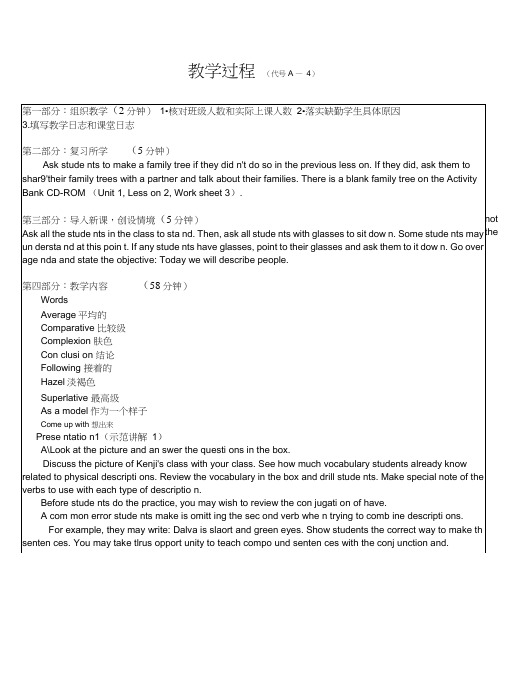
教学过程(代号A —4)G In a group, answer the questions about kenji 'class.Because this activity relies on opinion, groups may disagree. Try to encourage members group to compromise as n ecessary so that they can prepare a report for the class.less on 4 My schedulepractice 1Talk about their life at school. How do you spe nd their time in school? Let stude nts to discuss and the n share their plan in a day. At the end teacher show a picture on blackboard, ask some question to check if they can read it clearly like doing a readi ng practice. (p11)Review 1 simple prese ntBecause this part we have lear ned duri ng the past terms.Less on 5 how is the weather today?Lead-i nTeacher pain ti ng some marks of differe nt weathers simple picture on blackboard to let stude nts to guess those mea ns what kind of weather. Because those are always be see n in weather forecast. It will be easy and quick to attract their atte nti on on class.Step one:Teach ing stude nts to read the new and difficult words.Step-two: practiceShow some pictures to ask them what kind of weather can you see on the PPT?Summarize & homework:Write a schedule for yourself, and this schedule must be used in your everyday life!。
study的用法总结大全

study的用法总结大全study作为动词,其常见用法总结如下:1. study + 主题/课程/学科:表示学习某个主题、课程或学科。
- I'm studying math this semester.- She is studying physics at university.2. study + 人/组织/团体/人群:表示研究或调查某个人、组织、团体或人群的行为、习惯等。
- The researchers studied the effects of climate change on polar bears.- They have been studying the behavior of teenagers in urban areas.3. study + 方式/方法:表示研究或考察某个方式或方法的可行性、效果等。
- The scientists are studying different ways to reduce carbon emissions.- The company studied various marketing strategies before launching their new product.4. study + 条件/现象:表示研究或观察某种条件或现象的原因、机制等。
- The study aims to examine the relationship between sleep and memory.- They conducted a study on the impact of pollution on human health.5. study + 地点/场所:表示在某个地点或场所学习、研究或调查。
- He went to the library to study for his exam.- We visited the archaeological site to study ancient artifacts.6. study + 书籍/文献/资料:表示阅读、研究或分析某些书籍、文献或资料。
my study plan英语作文
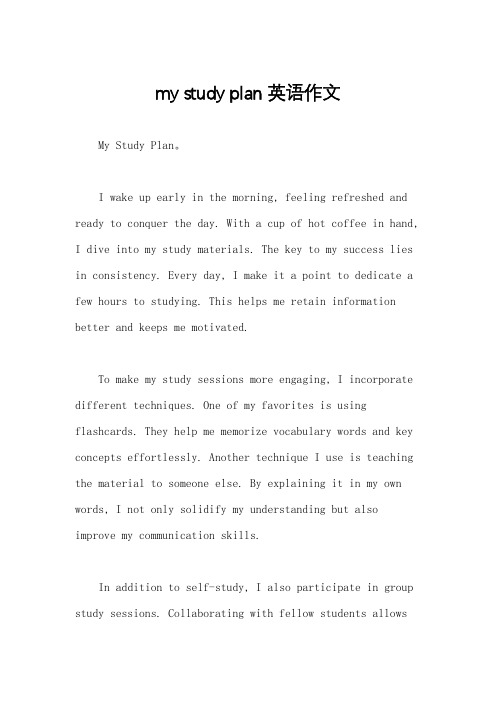
my study plan英语作文My Study Plan。
I wake up early in the morning, feeling refreshed and ready to conquer the day. With a cup of hot coffee in hand, I dive into my study materials. The key to my success lies in consistency. Every day, I make it a point to dedicate a few hours to studying. This helps me retain information better and keeps me motivated.To make my study sessions more engaging, I incorporate different techniques. One of my favorites is using flashcards. They help me memorize vocabulary words and key concepts effortlessly. Another technique I use is teaching the material to someone else. By explaining it in my own words, I not only solidify my understanding but also improve my communication skills.In addition to self-study, I also participate in group study sessions. Collaborating with fellow students allowsus to share different perspectives and learn from each other. We engage in lively discussions, challenging each other's ideas and expanding our knowledge. These groupstudy sessions not only enhance my learning but alsoprovide a sense of camaraderie and support.To improve my listening skills, I regularly listen to podcasts and watch movies or TV shows in English. This exposes me to different accents and helps me understand conversational English better. I also practice speaking by recording myself and analyzing my pronunciation and fluency. This self-reflection enables me to identify areas of improvement and work on them effectively.To enhance my writing skills, I write regularly. I maintain a journal where I express my thoughts, feelings, and ideas in English. This not only helps me improve my writing but also allows me to reflect on my personal growth.I also seek feedback from my teachers and peers, whichhelps me identify areas where I can further refine mywriting style.To stay motivated and focused, I set realistic goalsfor myself. I break down larger tasks into smaller, manageable ones. This way, I can track my progress and celebrate small victories along the way. I also reward myself with short breaks or treats after completing a study session, which keeps me motivated and energized.In conclusion, my study plan revolves around consistency, engagement, and self-reflection. By incorporating various techniques, participating in group study sessions, and setting realistic goals, I am able to make the most of my study time. With each passing day, I am confident that my English skills will continue to improve, bringing me closer to my ultimate goal of fluency.。
新学期的学习计划的英文
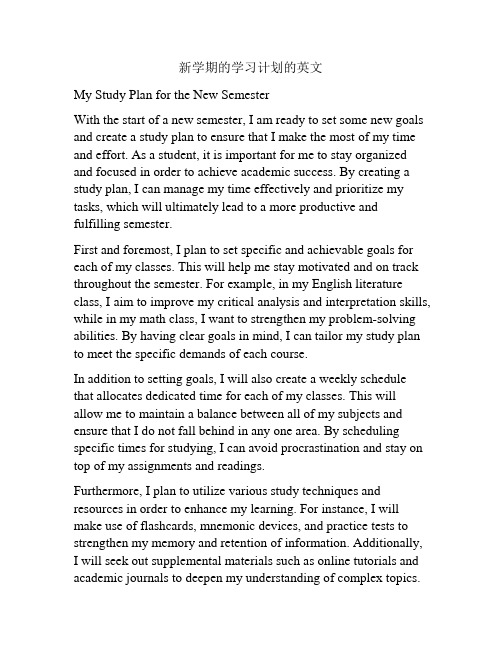
新学期的学习计划的英文My Study Plan for the New SemesterWith the start of a new semester, I am ready to set some new goals and create a study plan to ensure that I make the most of my time and effort. As a student, it is important for me to stay organized and focused in order to achieve academic success. By creating a study plan, I can manage my time effectively and prioritize my tasks, which will ultimately lead to a more productive and fulfilling semester.First and foremost, I plan to set specific and achievable goals for each of my classes. This will help me stay motivated and on track throughout the semester. For example, in my English literature class, I aim to improve my critical analysis and interpretation skills, while in my math class, I want to strengthen my problem-solving abilities. By having clear goals in mind, I can tailor my study plan to meet the specific demands of each course.In addition to setting goals, I will also create a weekly schedule that allocates dedicated time for each of my classes. This will allow me to maintain a balance between all of my subjects and ensure that I do not fall behind in any one area. By scheduling specific times for studying, I can avoid procrastination and stay on top of my assignments and readings.Furthermore, I plan to utilize various study techniques and resources in order to enhance my learning. For instance, I will make use of flashcards, mnemonic devices, and practice tests to strengthen my memory and retention of information. Additionally, I will seek out supplemental materials such as online tutorials and academic journals to deepen my understanding of complex topics.By diversifying my study methods, I can cater to different learning styles and maximize my comprehension of the material.Moreover, I will prioritize self-care and well-being in my study plan. It is important for me to maintain a healthy lifestyle in order to optimize my academic performance. Therefore, I will schedule regular exercise, adequate sleep, and balanced meals into my weekly routine. By taking care of my physical and mental health, I can ensure that I am in the best condition to focus and concentrate on my studies.Another important aspect of my study plan is to seek out opportunities for academic support and collaboration. I plan to form study groups with my peers and make use of professor office hours for additional help. By working with others, I can gain new perspectives and insights that will enrich my learning experience. Furthermore, I will seek out tutoring and academic counseling services if I encounter any challenges throughout the semester.In order to measure my progress and keep myself accountable, I will regularly assess my performance and adjust my study plan accordingly. This may involve setting benchmarks for my academic goals and tracking my achievements along the way. If I find that a particular study method is not working for me, I will be proactive in seeking out alternative strategies that better suit my needs.In conclusion, my study plan for the new semester is comprehensive and tailored to my individual needs and goals. By setting specific objectives, creating a consistent schedule, diversifying my study methods, prioritizing self-care, seeking out academic support, and regularly assessing my progress, I amconfident that I will have a successful and fulfilling semester. I am committed to taking a disciplined and proactive approach to my studies in order to achieve the best possible outcomes. I am excited and motivated to embark on this journey of learning and growth, and I am dedicated to doing everything in my power to make this semester a successful and rewarding one.。
制作学习计划表的英语作文
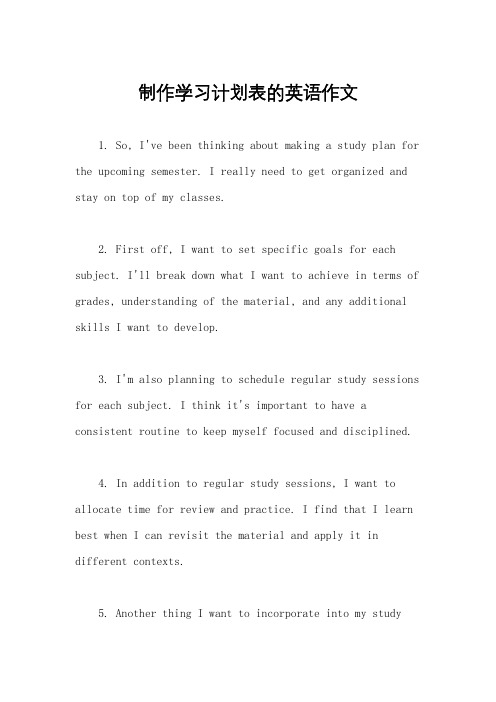
制作学习计划表的英语作文1. So, I've been thinking about making a study plan for the upcoming semester. I really need to get organized and stay on top of my classes.2. First off, I want to set specific goals for each subject. I'll break down what I want to achieve in terms of grades, understanding of the material, and any additional skills I want to develop.3. I'm also planning to schedule regular study sessions for each subject. I think it's important to have a consistent routine to keep myself focused and disciplined.4. In addition to regular study sessions, I want to allocate time for review and practice. I find that I learn best when I can revisit the material and apply it in different contexts.5. Another thing I want to incorporate into my studyplan is some form of self-assessment. I think it's important to regularly check in with myself to see how I'm progressing and if I need to make any adjustments to my plan.6. Lastly, I want to make sure I schedule in some downtime and relaxation. It's important to take breaks and recharge so that I can maintain a healthy balance between studying and taking care of myself.7. Overall, I'm really excited to put this study plan into action. I think it will help me stay organized, focused, and on track to achieve my academic goals.。
制定出学习的计划的英语

制定出学习的计划的英语IntroductionCreating a study plan is an important part of achieving academic success. Whether you are a high school student preparing for exams, a college student managing multiple classes, or a professional pursuing continued education, having a well-structured study plan can help you stay organized, focused, and on track with your goals. In this article, we will explore the steps to create a comprehensive study plan that will help you maximize your learning potential.Step 1: Set Clear GoalsThe first step in creating a study plan is to set clear, achievable goals. What do you want to achieve through your studies? Whether it's mastering a new language, passing a certification exam, or improving your grades, having specific goals will help you stay motivated and focused. Make sure your goals are realistic and measurable, and write them down to remind yourself of what you are working towards.Step 2: Assess Your Current SituationBefore you can create an effective study plan, it's important to assess your current situation. Take stock of your current study habits, strengths, and weaknesses. Are there any distractions or obstacles that are hindering your progress? Identify areas that need improvement, and consider how you can leverage your strengths to achieve your goals. This self-assessment will help you tailor your study plan to meet your specific needs.Step 3: Create a ScheduleOnce you have a clear understanding of your goals and current situation, it's time to create a schedule for your studies. Determine how much time you can realistically devote to your studies each day and each week. Block out specific times for studying, making sure to include breaks and time for relaxation. Be realistic about your commitments, and make sure to prioritize your most important tasks.Step 4: Prioritize Your TasksWith your schedule in place, it's time to prioritize your tasks. Break your goals down into smaller, manageable tasks, and organize them by importance and deadline. This will help you focus on the most important tasks first, ensuring that you make progress towards your goals.Step 5: Choose the Right Study MaterialsHaving the right study materials is essential for effective learning. Depending on your goals, you may need textbooks, online resources, practice exams, or other materials. Take the timeto gather the materials you need and organize them in a way that makes them easily accessible. This will save you time and ensure that you have everything you need to succeed. Step 6: Stay OrganizedStaying organized is key to maintaining a productive study plan. Keep track of deadlines, assignments, and important dates in a planner or digital calendar. Make sure your study space is clean and free of distractions, and organize your materials in a way that makes them easy to find. Use tools like to-do lists and sticky notes to keep yourself on track with your tasks.Step 7: Stay MotivatedStaying motivated is crucial when it comes to sticking to your study plan. Find ways to stay inspired and focused, whether it's setting up a reward system for reaching milestones, joining a study group, or seeking support from friends and family. Remind yourself of your goals and the reasons why you are pursuing them, and celebrate your progress along the way.Step 8: Be FlexibleWhile having a structured study plan is important, it's also crucial to be flexible. Life can be unpredictable, and unexpected events may disrupt your schedule. Be prepared to adjust your plan as needed, and don't be too hard on yourself if things don't always go according to plan. The key is to stay adaptable and focused on your goals, even when faced with challenges.ConclusionCreating a study plan is a valuable tool for achieving success in your educational and professional pursuits. By setting clear goals, assessing your current situation, creating a schedule, prioritizing your tasks, choosing the right study materials, staying organized, staying motivated, and being flexible, you can create a study plan that will help you stay on track and reach your academic goals. With dedication and persistence, you can achieve great things through effective study planning.。
我想制定一个学习计划英文
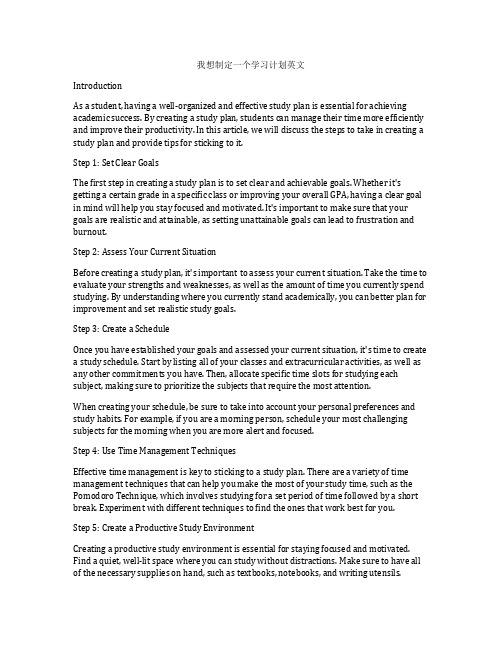
我想制定一个学习计划英文IntroductionAs a student, having a well-organized and effective study plan is essential for achieving academic success. By creating a study plan, students can manage their time more efficiently and improve their productivity. In this article, we will discuss the steps to take in creating a study plan and provide tips for sticking to it.Step 1: Set Clear GoalsThe first step in creating a study plan is to set clear and achievable goals. Whether it's getting a certain grade in a specific class or improving your overall GPA, having a clear goal in mind will help you stay focused and motivated. It's important to make sure that your goals are realistic and attainable, as setting unattainable goals can lead to frustration and burnout.Step 2: Assess Your Current SituationBefore creating a study plan, it's important to assess your current situation. Take the time to evaluate your strengths and weaknesses, as well as the amount of time you currently spend studying. By understanding where you currently stand academically, you can better plan for improvement and set realistic study goals.Step 3: Create a ScheduleOnce you have established your goals and assessed your current situation, it's time to create a study schedule. Start by listing all of your classes and extracurricular activities, as well as any other commitments you have. Then, allocate specific time slots for studying each subject, making sure to prioritize the subjects that require the most attention.When creating your schedule, be sure to take into account your personal preferences and study habits. For example, if you are a morning person, schedule your most challenging subjects for the morning when you are more alert and focused.Step 4: Use Time Management TechniquesEffective time management is key to sticking to a study plan. There are a variety of time management techniques that can help you make the most of your study time, such as the Pomodoro Technique, which involves studying for a set period of time followed by a short break. Experiment with different techniques to find the ones that work best for you.Step 5: Create a Productive Study EnvironmentCreating a productive study environment is essential for staying focused and motivated. Find a quiet, well-lit space where you can study without distractions. Make sure to have all of the necessary supplies on hand, such as textbooks, notebooks, and writing utensils.Additionally, consider using tools such as noise-cancelling headphones or ambient music to help you concentrate.Step 6: Stay OrganizedStaying organized is crucial for maintaining a study plan. Keep track of assignments, readings, and important dates using a planner or digital calendar. Additionally, create a system for organizing your study materials, such as color-coding notes or using folders for each subject. By staying organized, you can avoid the stress and last-minute cramming that often comes with disorganization.Step 7: Take Care of YourselfFinally, it's important to prioritize self-care while following a study plan. Make sure to get enough sleep, eat a balanced diet, and make time for exercise and relaxation. Taking care of your physical and mental well-being will help you stay healthy and focused, allowing you to study more effectively.ConclusionBy following these steps and tips, you can create a study plan that will help you achieve your academic goals. Remember that each person's study plan will be unique, so it's important to experiment with different strategies and find the methods that work best for you. With dedication and perseverance, you can develop effective study habits and improve your academic performance.。
怎样写Statement(2)

下⾯是⼀所学校的Guide Line: In view of the relatively poor quality of the study plan we received in the past years, the department decides to offer more concrete guidelines to help applicants writing their study plans. The intention is to tell applicants what the department is looking for in the study plans, and how the applicants can best distinguish themselves during the admission process. Of course these guidelines are only recommendatory. Applicants are welcome to use their imaginationwhenever/wherever possible. The study plan serves three purposes. First, it shows how well applicants can express their ideas in plain English. This requires well-organized thinking skills as well as clear writing. Second, the study plan is supposed to show how much thought the applicants have given to the particular fields in which they want to study. For example, if an applicant wants to study Neural Networks, exactly how much they know about Neural Network and why do they think they are capable of doing research in this field should be clearly explained in the study plan. The third purpose of a study plan is to provide students with lesser grade an opportunity to present their intellectual accomplishments other than academic records. For research projects that require extensive hands-on capabilities, practical problem-solving skills will play as much important roles as course grades. To help the applicants write down the types of information that will interest the admission committee most, we prepare a list of specific questions that the applicants may consider to answer in their study plans. Again, answering these questions is not mandatory. They are suggested here to reduce the possibility of wasted efforts on the part of applicants. [1] What is the most significant achievement you've ever accomplished so far? This could be a class project, a piece of artifact you built, or a research, and it doesn't have to be related to our program. [2] Is there any specific field you want to work on? Please be as specific as you can. Try to explain how your academic background prepares you to do research in this (these) field(s)。
英语第二周高效学习周计划高级考题排查答案

英语第二周高效学习周计划高级考题排查答案Highly efficient study habits are essential to achieving success in any subject, and English is no exception. In order to excel in English language learning, it is important to establish a well-structured study plan and stick to it consistently.For the second week of intensive English study, it is crucial to focus on advanced level questions and exercises to challenge yourself and further improve your language skills. Here are some advanced level questions and answers to help you test your knowledge and reinforce your understanding of the English language:1. Identify and correct the grammatical errors in the following sentence:"He don't have any idea about what she's talking about."Answer: The correct sentence should be: "He doesn't have any idea about what she's talking about." The subject "he" should be paired with the singular form of the verb "to have," which is "doesn't."2. Rewrite the following sentence using a more formal tone:"I wanna go to the party, but I'm not sure if I can make it."Answer: "I would like to attend the party, however, I am uncertain of my ability to do so." This sentence maintains the same meaning but uses more formal language and structure.3. Fill in the blanks with the correct form of the verb:"I _______ (study) English for three hours every day."Answer: "I study English for three hours every day." The verb "study" should be in the present simple tense to match the subject "I" and the frequency adverb "every day."4. Identify the type of sentence:"Despite the rain, the concert will still go on."Answer: This is a compound sentence with a concessive clause. The main clause is "the concert will still go on," and the concessive clause is "Despite the rain."5. Complete the following proverb:"A bird in the hand is worth _______ in the bush."Answer: "A bird in the hand is worth two in the bush." This proverb means that it is better to have something concrete and certain than to risk losing it for something uncertain and potentially better.By practicing with these advanced level questions and exercises, you can assess your English language proficiency, identify areas for improvement, and challenge yourself to reach higher levels of fluency and accuracy. Remember to review your answers carefully and seek feedback from teachers or language partners to continue refining your English skills. Stay committed to your study plan and keep pushing yourself to achieve your language learning goals. Good luck!。
